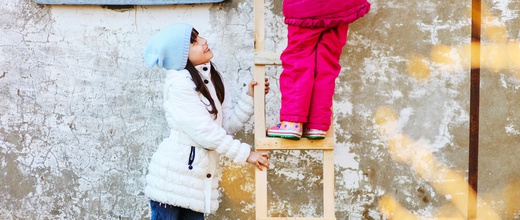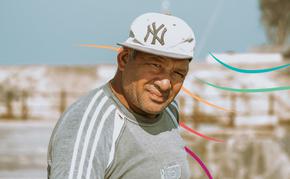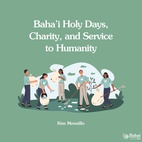The views expressed in our content reflect individual perspectives and do not represent the official views of the Baha'i Faith.
My brothers and I had an unorthodox, multi-cultural childhood—our unusual upbringing definitely defied convention.
We were born in India to an Australian mother and an Iranian father. To give you an idea of how we were raised, this quotation from the Baha’i teachings was one of my dad’s favorites, especially the part which talks about accustoming your children to hardship:
Children are the most precious treasure a community can possess, for in them are the promise and guarantee of the future. They bear the seeds of the character of future society which is largely shaped by what the adults constituting the community do or fail to do with respect to children. They are a trust no community can neglect with impunity. An all-embracing love of children, the manner of treating them, the quality of attention shown them, the spirit of adult behavior toward them—these are all among the vital aspects of the requisite attitude. Love demands discipline, the courage to accustom children to hardship, not to indulge their whims or leave them entirely to their own devices. An atmosphere needs to be maintained in which children feel that they belong to the community and share in its purpose. – The Universal House of Justice, April, 2000.
You may be thinking that we had a very difficult childhood, or that we had to work very hard as children, but that is not what my father meant when he said he wanted to accustom us to hardship. We had a relatively comfortable life and had most of the things we wished for, but our father wanted us to see what life was like on the other side, and India was one of the best places to do it.
We grew up witnessing firsthand the abject poverty that some people lived in, contrasted with the decadence of the rich, upper class sections of society—and we didn’t just witness it. We experienced it. We spent a lot of time in local villages, donated clothes and all our toys (except one) to the less fortunate each year, and were never made to feel privileged or better than anyone else. We travelled in trains sitting on a newspaper on the floor, sometimes crammed into carriages on the local trains in Mumbai, and realized that thousands of people travelled like that every day. It was a humbling experience.
We rarely ate out unless it was a family event, and usually ate simple food at home. We were taught from a young age not to waste, and only to take what we could finish. I occasionally accompanied my mother on visits to the poorest of the poor, living in makeshift shelters, where she would teach them about health and provide literacy education to young girls.
So how did witnessing all this hardship help us? For one thing, it cultivated a deep sense of gratitude within us. We often hear about poor people who have nothing, but are much happier than rich people with everything they need. This was a stark reality in India. People would be grateful for the smallest things, such as electricity, or having a friend visit them, or someone showing them a bit of kindness. People went out of their way to help each other. I remember innumerable instances of people who had nothing giving us everything they had—a mango farmer who knew my father and had eight children of his own to feed brought a sack of mangoes to us every summer; the poor people living in shanties offered tea and snacks to my mother and I when we visited them, despite our resistance, when they themselves couldn’t afford more than a single meal each day.
The Baha’i writings say:
Children are even as a branch that is fresh and green; they will grow up in whatever way ye train them. Take the utmost care to give them high ideals and goals, so that once they come of age, they will cast their beams like brilliant candles on the world, and will not be defiled by lusts and passions in the way of animals, heedless and unaware, but instead will set their hearts on achieving everlasting honor and acquiring all the excellences of humankind. – Abdu’l-Baha, Selections from the Writings of Abdu’l-Baha, p. 136.
So I have experienced through my upbringing and my own interactions with children that “tough love” does not mean being cruel to a child or denying them their basic needs. It means that we have the courage to push them beyond their comfort zones, to help them understand the plight of the less fortunate, and not just understand it but experience it firsthand.
Children need to know what it’s like to be denied the things you want, to experience how people live their lives without the basic amenities we take for granted, and to learn that other people’s problems are often so much bigger than our own when we cultivate compassion and look beyond ourselves to understand another person’s reality.

















Comments
Sign in or create an account
Continue with Facebookor